牛津译林版(2020)必修第一册Unit 1 Back to school Extended reading & Project课件(共36张)
文档属性
| 名称 | 牛津译林版(2020)必修第一册Unit 1 Back to school Extended reading & Project课件(共36张) | 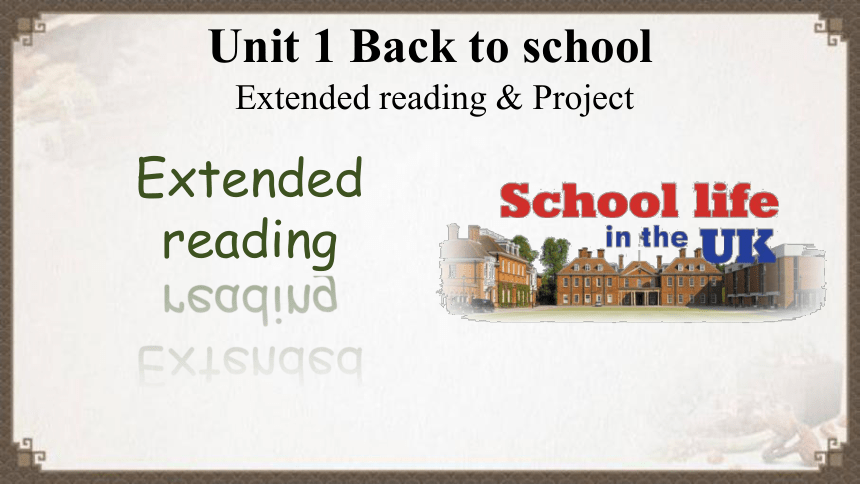 | |
| 格式 | pptx | ||
| 文件大小 | 5.4MB | ||
| 资源类型 | 教案 | ||
| 版本资源 | 牛津译林版(2019) | ||
| 科目 | 英语 | ||
| 更新时间 | 2024-10-22 22:31:02 | ||
图片预览


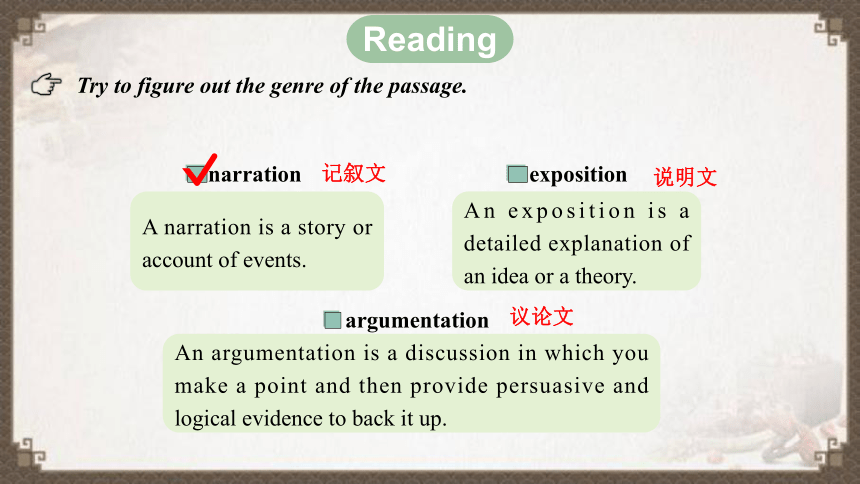
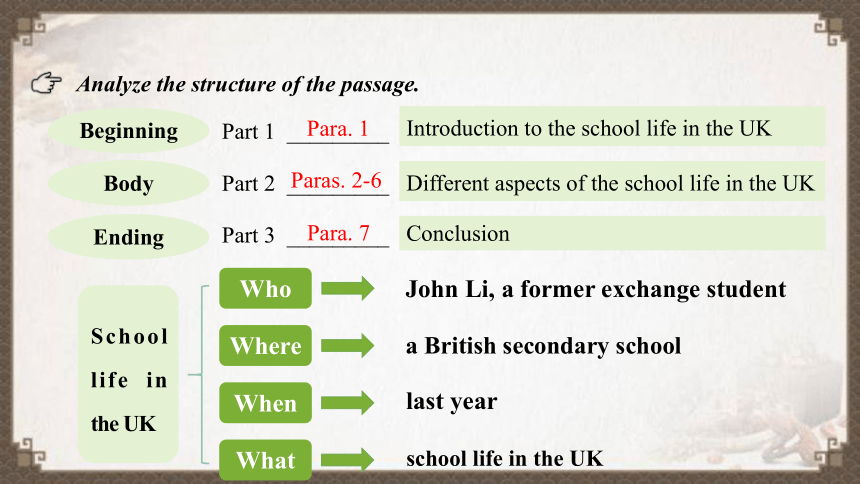
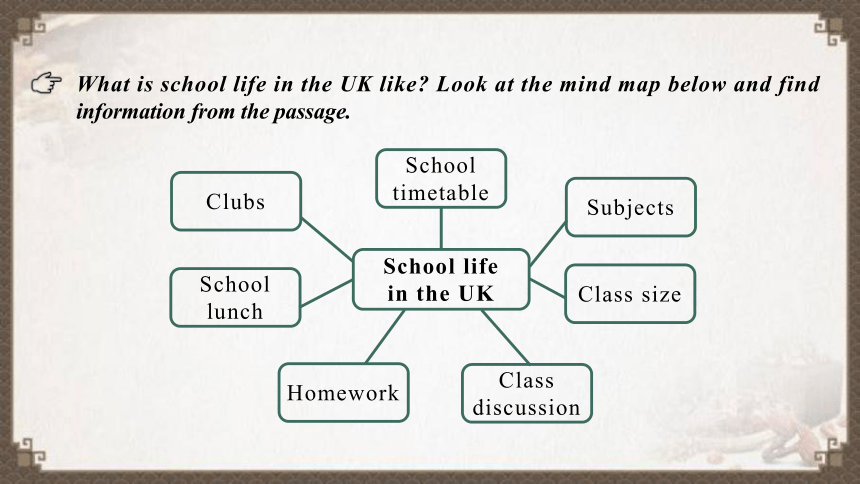
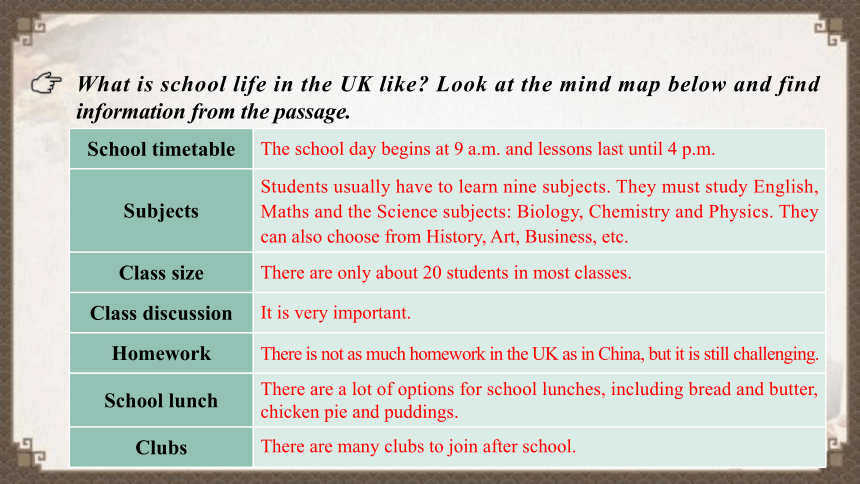
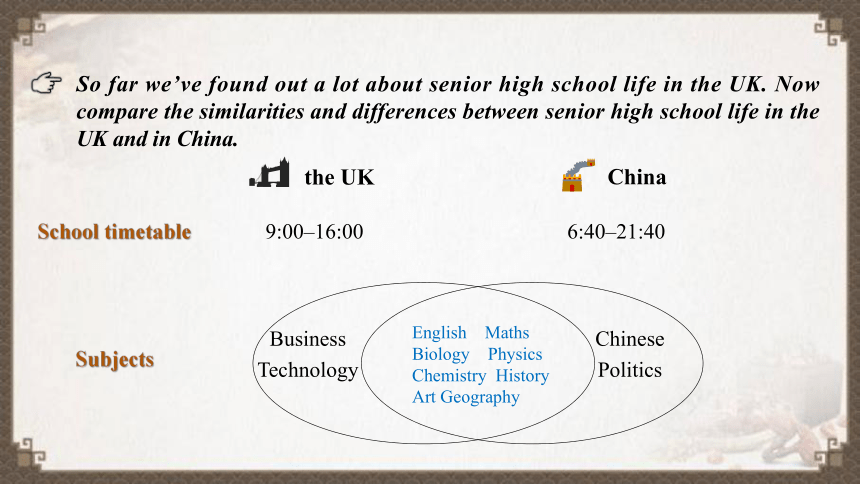
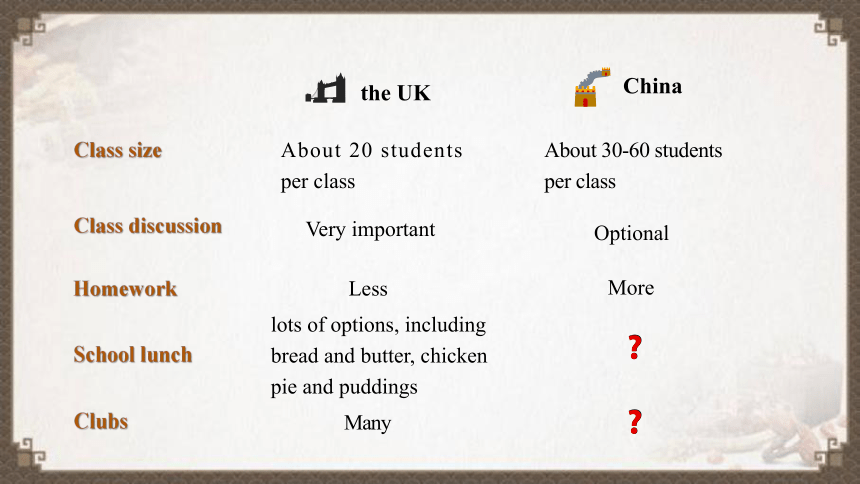
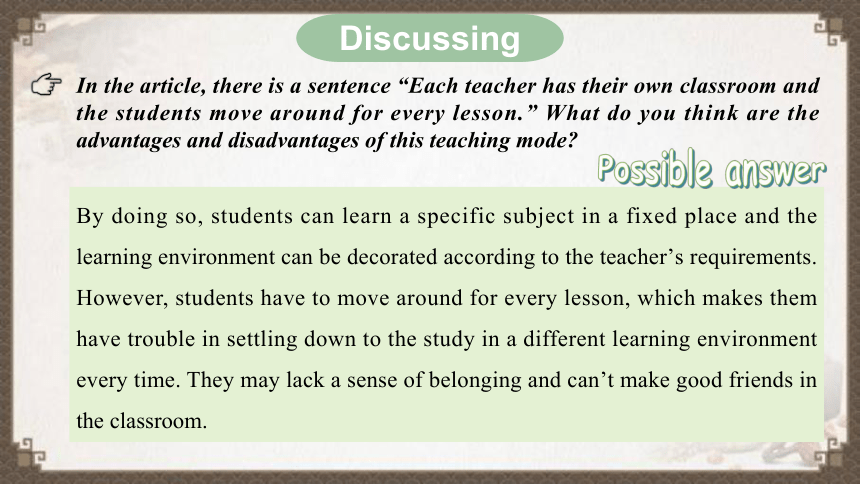
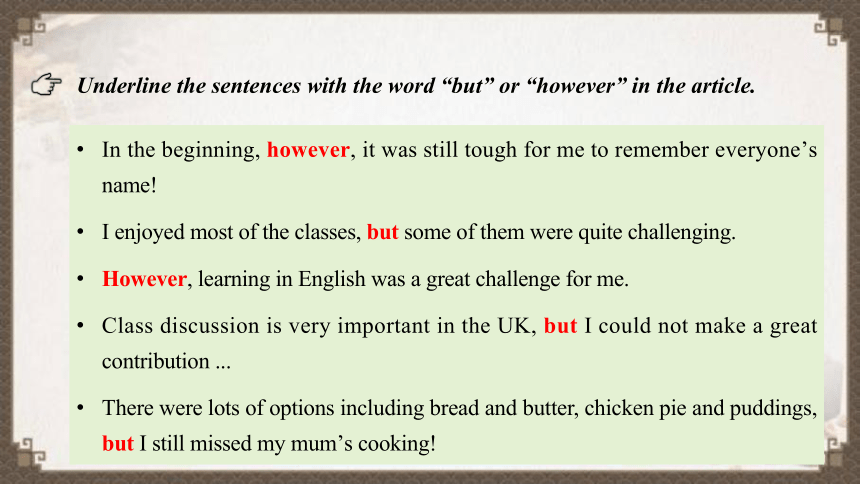


文档简介
(共36张PPT)
Extended reading
Unit 1 Back to school
Extended reading & Project
Lead in
How much do you know about school life abroad
Schools abroad are different from schools in China in many aspects. For example, the choice of subjects in schools abroad is relatively flexible, so students can explore new ideas which they are interested in more freely.
Do you want to take part in an exchange program
...
Reading
Try to figure out the genre of the passage.
narration
A narration is a story or account of events.
exposition
An exposition is a detailed explanation of an idea or a theory.
argumentation
An argumentation is a discussion in which you make a point and then provide persuasive and logical evidence to back it up.
记叙文
说明文
议论文
Analyze the structure of the passage.
Beginning
Body
Ending
Part 1 _________
Part 2 _________
Part 3 _________
Conclusion
Para. 1
Paras. 2-6
Para. 7
Introduction to the school life in the UK
Different aspects of the school life in the UK
School life in the UK
Who
Where
When
What
John Li, a former exchange student
a British secondary school
last year
school life in the UK
What is school life in the UK like Look at the mind map below and find information from the passage.
School life
in the UK
School
timetable
Clubs
School
lunch
Homework
Class
discussion
Subjects
Class size
What is school life in the UK like Look at the mind map below and find information from the passage.
School timetable
Subjects
Class size
Class discussion
Homework
School lunch
Clubs
The school day begins at 9 a.m. and lessons last until 4 p.m.
Students usually have to learn nine subjects. They must study English, Maths and the Science subjects: Biology, Chemistry and Physics. They can also choose from History, Art, Business, etc.
There are only about 20 students in most classes.
It is very important.
There is not as much homework in the UK as in China, but it is still challenging.
There are a lot of options for school lunches, including bread and butter, chicken pie and puddings.
There are many clubs to join after school.
So far we’ve found out a lot about senior high school life in the UK. Now compare the similarities and differences between senior high school life in the UK and in China.
China
the UK
School timetable
Subjects
9:00–16:00
6:40–21:40
Business
Technology
English Maths
Biology Physics
Chemistry History Art Geography
Chinese
Politics
China
the UK
Class size
Class discussion
Homework
School lunch
Clubs
Less
More
Very important
Optional
About 20 students per class
About 30-60 students per class
lots of options, including bread and butter, chicken pie and puddings
Many
Discussing
In the article, there is a sentence “Each teacher has their own classroom and the students move around for every lesson.” What do you think are the advantages and disadvantages of this teaching mode
By doing so, students can learn a specific subject in a fixed place and the learning environment can be decorated according to the teacher’s requirements. However, students have to move around for every lesson, which makes them have trouble in settling down to the study in a different learning environment every time. They may lack a sense of belonging and can’t make good friends in the classroom.
Possible answer
Underline the sentences with the word “but” or “however” in the article.
In the beginning, however, it was still tough for me to remember everyone’s name!
I enjoyed most of the classes, but some of them were quite challenging.
However, learning in English was a great challenge for me.
Class discussion is very important in the UK, but I could not make a great contribution ...
There were lots of options including bread and butter, chicken pie and puddings, but I still missed my mum’s cooking!
Discuss the advantages and disadvantages of studying abroad. Try to make sentences with the word “but” or “however”.
Studying abroad is a good opportunity to experience different cultures, which is helpful in broadening our horizons. It is beneficial for us to foster our perseverance and the ability to live independently. Also, there is no denying that some foreign technologies are advanced, so we can learn more in foreign countries and develop ourselves better.
However, studying abroad also brings about challenges. We may have difficulty in adapting to the new environment. Having lived in China for many years, we may feel uncomfortable adjusting to foreign learning methods and ways of life. Besides, it will cost a lot of money for living and tuition, but not every student’s family can afford it.
Possible answer
What is your dream school like Write about it and give reasons.
My dream school would have very modern facilities. Students would be able to choose their subjects based on their interests. There would be more than 20 subjects to choose from and some of them would be online courses. As for textbooks, there would be no paper textbooks at all. Instead, we would take our personal computers to school every day. That way, learning would become more efficient and enjoyable!
Possible answer
Words and Expressions
exchange n. & vt. 交换;交流;兑换
搭配
an exchange student 一位交换生 in exchange (for ...) 作为(对……的)交换
exchange ... for ... 把……换取/兑换…… exchange sth with sb 与某人交流/交换某物
exchange ideas/opinions/views/words 交流想法/观点
例句
When I was a middle school student I came to China as an exchange student.
我上中学的时候,我作为交换生来到中国。
Mary is teaching me English in exchange for my teaching her English.
玛丽教我英语,作为交换,我教她汉语。
When we go to America, we have to exchange RMB for dollars.
当我们去美国的时候,我们必须把人民币换成美元。
Before making the decision, he exchanged ideas with his parents.
在做这个决定之前,他和父母交流了想法。
1. Last year, I had the chance to study at a British secondary school as an exchange student. (P11)
去年,我有机会作为交换生到英国的一所中学读书。
单词
2. In the beginning, however, it was still tough for me to remember everyone’s name! (P11)
然而,刚开始时,我仍然很难记住所有人的名字!
tough adj. 艰难的;严厉的;坚强的;坚固的
搭配
a tough childhood/time/decision 苦难的童年/煎熬的日子/艰难的决定
be tough on/with 对……无情/严厉
talk tough 说话强硬
tough shoes/skin 结实的鞋子/坚韧的皮肤
例句
Don’t be so tough on her—she was just trying to help.
别对她这么严厉,她只是想帮忙而已。
It is tough for her to achieve a balance between work and family.
对她来说,平衡工作和家庭是艰难的。
3. I like it so much that I still use it as my alarm! (P11)
我太喜欢这只钟了,现在还在用它当闹钟呢!
alarm n. 闹钟;恐慌;警报;警报器 vt. 使惊恐,使害怕
搭配
set one’s alarm for 把闹钟设在……
a false alarm 虚惊一场
in alarm 惊慌地
a fire/smoke alarm 防火/烟雾警报器
set off the alarm 触动警报器
例句
I set my alarm for 6:30 a.m. before going to bed. 睡前我把闹钟设在早晨六点半。
She looked around in alarm. 她惊慌地看看四周。
Opening the front door will set off the alarm. 一开前门,警铃就会响。
3. I like it so much that I still use it as my alarm! (P11)
我太喜欢这只钟了,现在还在用它当闹钟呢!
alarm n. 闹钟;恐慌;警报;警报器 vt. 使惊恐,使害怕
拓展
alarming adj. 令人惊慌的
alarmed adj. 感到惊慌的 be alarmed at/by 因为……而感到担心、害怕
例句
The Amazon rainforest is disappearing at an alarming speed.
亚马孙热带雨林正在以惊人的速度消失。
She was alarmed by the thought of going back home alone.
她一想到要独自一人回家就害怕。
4. Class discussion is very important in the UK, but I could not make a great contribution because
sometimes I wasn’t able to express myself clearly in English. (P11)
在英国,课堂讨论很重要,可是我的贡献不大,因为有时候我没办法用英语清楚地表达自
己的观点。
contribution n. 贡献;捐款;捐赠
搭配
make a contribution to 对……做出贡献
a huge/great/major contribution 伟大的贡献
a(n) significant/important contribution 重大的贡献
例句
Marie Curie made a great contribution to human development.
玛丽·居里为人类发展做出了巨大的贡献。
contribution n. 贡献;捐款;捐赠
拓展
contribute vi. & vt. 捐款;添加,增进;是……的原因之一
contribute to 有助于;捐献;带来;促成
例句
She contributed all her pocket money to the earthquake fund.
她把所有的零花钱都捐给了地震基金。
I believe that each of us can contribute to the future of the world.
我相信我们每一个人都能为世界的未来做出贡献。
4. Class discussion is very important in the UK, but I could not make a great contribution because
sometimes I wasn’t able to express myself clearly in English. (P11)
在英国,课堂讨论很重要,可是我的贡献不大,因为有时候我没办法用英语清楚地表达自
己的观点。
5. Fortunately, my teachers and classmates were always helpful and gave me lots of encouragement.
(P11-12)
幸好,老师和同学们一直都乐于帮助我,并给予我很多鼓励。
fortunately adv. 幸运地,幸亏
例句
Fortunately, the kid was saved by a passerby from the pond.
幸运的是,那个孩子被路人从池塘里救上来了。
I got stuck in the traffic jam, but fortunately I arrived on time.
我遇上了交通堵塞,但幸运的是我按时到了。
拓展
unfortunately adv. 遗憾地,不幸地
例句
Unfortunately, no one took my opinion seriously.
不幸的是,没有人严肃看待我的意见。
6. The one that attracted me most was the Rugby Club. (P12)
最吸引我的是橄榄球俱乐部。
attract vt. 吸引,使喜爱;招引;引起(反应)
搭配
attract sb to sb/sth 引起某人对……的好感 be attracted by 被……吸引
例句
What attracted me to her was her big eyes. 吸引我的是她的大眼睛。
I was attracted by her beautiful singing. 我被她动听的演唱吸引。
拓展
attractive adj. 有吸引力的 attraction n. 吸引;吸引力;具有吸引力的事物
例句
She was an attractive woman when she was young. 她年轻的时候很有魅力。
Ice cream has great attraction for children. 冰激凌对孩子们有很大的吸引力。
The Great Wall is a famous tourist attraction. 长城是一处著名的旅游胜地。
1. I made a clock to take home. (P11)
我做了一只钟带回家。
*动词不定式作后置定语
句式剖析
动词不定式to take home修饰clock,作后置定语。
考点提炼
动词不定式是一种常见的非谓语动词形式,由“to+动词原形”构成。当作定语的动词不定式修饰的名词或代词是不定式动作的承受者时,不定式既可以用主动形式,也可以用被动形式,但含义有所不同。如:
I have an article to type. (不定式to type的施动者是句子的主语)
I have an article to be typed. (不定式to be typed的施动者不是句子的主语)
句式
归纳拓展
(1) the first、the second等序数词,the best等最高级,the only、the last等后面经常跟动词不定式作定语。如:
She is always the first to come and the last to leave. 她总是第一个来,最后一个离开。
He is the best man to do the job. 他是做这份工作的最佳人选。
(2) 动词不定式常修饰的名词有ability、chance、hope、plan、decision、promise等。如:
He finally made the decision to continue with the project.
他最终做了决定,继续开展这个项目。
She kept her promise to write to me monthly.
她信守诺言,每个月都写信给我。
2. I like it so much that I still use it as my alarm! (P11)
我太喜欢这只钟了,以至于现在还在用它当闹钟呢!
*so ... that ... 引导的结果状语从句
句式剖析
so ... that ...意为“如此……以至于……”,其中so是副词,后面要跟形容词或副词,而that引导结果状语从句。
考点提炼
形容词/副词
so + 形容词+a(n)+单数可数名词 +that
many/few+可数名词复数
much/little+不可数名词
归纳拓展
(1) so that引导结果状语从句时,置于主句之后,常用逗号隔开。如:
He missed the bus, so that he was late for school. 他错过了公共汽车,所以上学迟到了。
(2) so that引导目的状语从句时,置于主句之后,从句中需要用情态动词may、can或will等,一般不用逗号隔开。如:
He got up early so that he could catch the bus. 为了能赶上公共汽车,他起得很早。
(3) such ... that ... 也可以表示“如此……以至于……”的意思。如:
形容词+不可数名词
such 形容词+可数名词复数 +that
a(n)+形容词+可数名词单数
(4) 当so/such ... 置于句首时,主句要进行部分倒装。如:
He spoke so fast that we couldn’t follow him. 他说得太快,我们跟不上。
=So fast did he speak that we couldn’t follow him.
3. I still have photos of myself acting in William Shakespeare’s A Midsummer Night’s Dream. (P12)
我还留着自己参演莎士比亚的《仲夏夜之梦》时的剧照。
*动词-ing形式的复合结构作宾语
句式剖析
动词-ing形式短语acting in William Shakespeare’s A Midsummer Night’s Dream作of的宾语,介宾短语作定语修饰photos。
考点提炼
一般情况下,动词-ing形式的逻辑主语为谓语动词的主语;如果动词-ing形式中动作的发出者不是谓语动词的主语时,则需要有自己的逻辑主语。这种带主语的动词-ing形式叫作动词-ing形式的复合结构。如:
He dislikes staying up late. 他不喜欢熬夜。
He dislikes his wife’s staying up late. 他不喜欢他的妻子熬夜。
归纳拓展
在正式语体中,动词-ing形式作宾语时,前面通常用一个名词所有格或形容词性物主代词来表示它逻辑上的主语;而在口语和非正式语体中,逻辑主语则经常使用名词的通格或人称代词的宾格形式。如:
Do you mind my/me opening the window
你介意我开窗吗?
I’m amazed at Tom’s/Tom suddenly becoming a polite boy.
让我吃惊的是,汤姆突然变成了一个懂礼貌的男孩。
He insisted on the plan’s/plan being put into action immediately.
他坚持要求马上把这个计划付诸实施。
I really appreciate you/your calling back so soon.
真的很感激你这么快回电话。
4. Chinese Calligraphy is one of the many optional courses offered to students who are interested in traditional art. (P12)
“中国书法”是提供给对传统艺术感兴趣的学生的众多选修课之一。
*动词-ed形式作定语
句式剖析
动词-ed形式offered作courses的后置定语,等同于courses that are offered to students。
考点提炼
动词-ed形式作定语时,被修饰的名词与非谓语动词是被动关系。如:
The books collected will be donated to the rural schools. 收集来的书将被捐赠给乡村学校。
有些动词-ed形式不表示被动,而只是表示完成。如:boiled water 开水 fallen leaves 落叶
当被修饰的名词与非谓语动词为被动关系且表示正在进行时,需用being+动词-ed。如:
The tower being built is the tallest building in our city. 在建的塔是我市最高的建筑。
归纳拓展
动词-ing形式作定语时,既可表示被修饰词与非谓语动词为主动关系,也可表示正在进行。如:
developing countries 发展中国家
Project
Making a booklet about your school
By the end of this section, you will be able to:
make a booklet about school life through cooperation and exploration;
present the outcome of group work;
evaluate and comment on each other’s work.
Learning objectives
Preparing
As a class, discuss different aspects about your school. You can use the ideas below or think of other ideas. Then in groups, pick one aspect to research.
lessons teachers school history school events clubs teaching buildings labs library
computer room ...
Work in groups and collect different kinds of booklets as samples for discussion.
As a group, research your chosen aspect. Use the ideas below to help you.
Where can you find the information you need
You can visit the school website or interview your teachers to find out more about
your school.
What kind of questions should you ask when interviewing a teacher
It is a good idea to start with general questions and then move on to specific ones, e.g.
Can you tell me something about the history of our school (general)
When was the main teaching building built (specific)
What else do you need for your booklet
Besides words, you also need pictures for your booklet. You can take photos or
download pictures from your school website. Make sure all words and pictures are
laid out neatly and beautifully.
Study more about the sample booklet on page 13.
1. Which aspect of school life does this sample cover
An optional course called Chinese Calligraphy.
Implementing
2. What information does this sample contain
The time, place, content and activities of the optional course.
3. In your opinion, what are the sample’s highlights What can you learn from
the sample Is there still room for improvement
It’s very logical. Details are included so it is easy for readers to understand the features of the optional course. The plain language style sets a good example to us. The booklet will be more convincing and vivid if more pictures of their classroom, or their works, are added.
As a group, put together your information to make your part of the booklet. Use the example below to help you. Present your part to the rest of the class. Then as a class, put all the parts together to make the booklet.
General information
Specific information
Picture
Present your booklet to the whole class and talk about your chosen topic. At the end of each presentation, other groups should ask questions about it or put forward suggestions.
Evaluate the work of each project. Have the whole class vote on which booklet page is the best.
Evaluating
1. Polish your writing.
2. Reflect on the booklet and think about how you can make the school a better place. Write a letter to your school principal presenting your suggestions.
Homework
Extended reading
Unit 1 Back to school
Extended reading & Project
Lead in
How much do you know about school life abroad
Schools abroad are different from schools in China in many aspects. For example, the choice of subjects in schools abroad is relatively flexible, so students can explore new ideas which they are interested in more freely.
Do you want to take part in an exchange program
...
Reading
Try to figure out the genre of the passage.
narration
A narration is a story or account of events.
exposition
An exposition is a detailed explanation of an idea or a theory.
argumentation
An argumentation is a discussion in which you make a point and then provide persuasive and logical evidence to back it up.
记叙文
说明文
议论文
Analyze the structure of the passage.
Beginning
Body
Ending
Part 1 _________
Part 2 _________
Part 3 _________
Conclusion
Para. 1
Paras. 2-6
Para. 7
Introduction to the school life in the UK
Different aspects of the school life in the UK
School life in the UK
Who
Where
When
What
John Li, a former exchange student
a British secondary school
last year
school life in the UK
What is school life in the UK like Look at the mind map below and find information from the passage.
School life
in the UK
School
timetable
Clubs
School
lunch
Homework
Class
discussion
Subjects
Class size
What is school life in the UK like Look at the mind map below and find information from the passage.
School timetable
Subjects
Class size
Class discussion
Homework
School lunch
Clubs
The school day begins at 9 a.m. and lessons last until 4 p.m.
Students usually have to learn nine subjects. They must study English, Maths and the Science subjects: Biology, Chemistry and Physics. They can also choose from History, Art, Business, etc.
There are only about 20 students in most classes.
It is very important.
There is not as much homework in the UK as in China, but it is still challenging.
There are a lot of options for school lunches, including bread and butter, chicken pie and puddings.
There are many clubs to join after school.
So far we’ve found out a lot about senior high school life in the UK. Now compare the similarities and differences between senior high school life in the UK and in China.
China
the UK
School timetable
Subjects
9:00–16:00
6:40–21:40
Business
Technology
English Maths
Biology Physics
Chemistry History Art Geography
Chinese
Politics
China
the UK
Class size
Class discussion
Homework
School lunch
Clubs
Less
More
Very important
Optional
About 20 students per class
About 30-60 students per class
lots of options, including bread and butter, chicken pie and puddings
Many
Discussing
In the article, there is a sentence “Each teacher has their own classroom and the students move around for every lesson.” What do you think are the advantages and disadvantages of this teaching mode
By doing so, students can learn a specific subject in a fixed place and the learning environment can be decorated according to the teacher’s requirements. However, students have to move around for every lesson, which makes them have trouble in settling down to the study in a different learning environment every time. They may lack a sense of belonging and can’t make good friends in the classroom.
Possible answer
Underline the sentences with the word “but” or “however” in the article.
In the beginning, however, it was still tough for me to remember everyone’s name!
I enjoyed most of the classes, but some of them were quite challenging.
However, learning in English was a great challenge for me.
Class discussion is very important in the UK, but I could not make a great contribution ...
There were lots of options including bread and butter, chicken pie and puddings, but I still missed my mum’s cooking!
Discuss the advantages and disadvantages of studying abroad. Try to make sentences with the word “but” or “however”.
Studying abroad is a good opportunity to experience different cultures, which is helpful in broadening our horizons. It is beneficial for us to foster our perseverance and the ability to live independently. Also, there is no denying that some foreign technologies are advanced, so we can learn more in foreign countries and develop ourselves better.
However, studying abroad also brings about challenges. We may have difficulty in adapting to the new environment. Having lived in China for many years, we may feel uncomfortable adjusting to foreign learning methods and ways of life. Besides, it will cost a lot of money for living and tuition, but not every student’s family can afford it.
Possible answer
What is your dream school like Write about it and give reasons.
My dream school would have very modern facilities. Students would be able to choose their subjects based on their interests. There would be more than 20 subjects to choose from and some of them would be online courses. As for textbooks, there would be no paper textbooks at all. Instead, we would take our personal computers to school every day. That way, learning would become more efficient and enjoyable!
Possible answer
Words and Expressions
exchange n. & vt. 交换;交流;兑换
搭配
an exchange student 一位交换生 in exchange (for ...) 作为(对……的)交换
exchange ... for ... 把……换取/兑换…… exchange sth with sb 与某人交流/交换某物
exchange ideas/opinions/views/words 交流想法/观点
例句
When I was a middle school student I came to China as an exchange student.
我上中学的时候,我作为交换生来到中国。
Mary is teaching me English in exchange for my teaching her English.
玛丽教我英语,作为交换,我教她汉语。
When we go to America, we have to exchange RMB for dollars.
当我们去美国的时候,我们必须把人民币换成美元。
Before making the decision, he exchanged ideas with his parents.
在做这个决定之前,他和父母交流了想法。
1. Last year, I had the chance to study at a British secondary school as an exchange student. (P11)
去年,我有机会作为交换生到英国的一所中学读书。
单词
2. In the beginning, however, it was still tough for me to remember everyone’s name! (P11)
然而,刚开始时,我仍然很难记住所有人的名字!
tough adj. 艰难的;严厉的;坚强的;坚固的
搭配
a tough childhood/time/decision 苦难的童年/煎熬的日子/艰难的决定
be tough on/with 对……无情/严厉
talk tough 说话强硬
tough shoes/skin 结实的鞋子/坚韧的皮肤
例句
Don’t be so tough on her—she was just trying to help.
别对她这么严厉,她只是想帮忙而已。
It is tough for her to achieve a balance between work and family.
对她来说,平衡工作和家庭是艰难的。
3. I like it so much that I still use it as my alarm! (P11)
我太喜欢这只钟了,现在还在用它当闹钟呢!
alarm n. 闹钟;恐慌;警报;警报器 vt. 使惊恐,使害怕
搭配
set one’s alarm for 把闹钟设在……
a false alarm 虚惊一场
in alarm 惊慌地
a fire/smoke alarm 防火/烟雾警报器
set off the alarm 触动警报器
例句
I set my alarm for 6:30 a.m. before going to bed. 睡前我把闹钟设在早晨六点半。
She looked around in alarm. 她惊慌地看看四周。
Opening the front door will set off the alarm. 一开前门,警铃就会响。
3. I like it so much that I still use it as my alarm! (P11)
我太喜欢这只钟了,现在还在用它当闹钟呢!
alarm n. 闹钟;恐慌;警报;警报器 vt. 使惊恐,使害怕
拓展
alarming adj. 令人惊慌的
alarmed adj. 感到惊慌的 be alarmed at/by 因为……而感到担心、害怕
例句
The Amazon rainforest is disappearing at an alarming speed.
亚马孙热带雨林正在以惊人的速度消失。
She was alarmed by the thought of going back home alone.
她一想到要独自一人回家就害怕。
4. Class discussion is very important in the UK, but I could not make a great contribution because
sometimes I wasn’t able to express myself clearly in English. (P11)
在英国,课堂讨论很重要,可是我的贡献不大,因为有时候我没办法用英语清楚地表达自
己的观点。
contribution n. 贡献;捐款;捐赠
搭配
make a contribution to 对……做出贡献
a huge/great/major contribution 伟大的贡献
a(n) significant/important contribution 重大的贡献
例句
Marie Curie made a great contribution to human development.
玛丽·居里为人类发展做出了巨大的贡献。
contribution n. 贡献;捐款;捐赠
拓展
contribute vi. & vt. 捐款;添加,增进;是……的原因之一
contribute to 有助于;捐献;带来;促成
例句
She contributed all her pocket money to the earthquake fund.
她把所有的零花钱都捐给了地震基金。
I believe that each of us can contribute to the future of the world.
我相信我们每一个人都能为世界的未来做出贡献。
4. Class discussion is very important in the UK, but I could not make a great contribution because
sometimes I wasn’t able to express myself clearly in English. (P11)
在英国,课堂讨论很重要,可是我的贡献不大,因为有时候我没办法用英语清楚地表达自
己的观点。
5. Fortunately, my teachers and classmates were always helpful and gave me lots of encouragement.
(P11-12)
幸好,老师和同学们一直都乐于帮助我,并给予我很多鼓励。
fortunately adv. 幸运地,幸亏
例句
Fortunately, the kid was saved by a passerby from the pond.
幸运的是,那个孩子被路人从池塘里救上来了。
I got stuck in the traffic jam, but fortunately I arrived on time.
我遇上了交通堵塞,但幸运的是我按时到了。
拓展
unfortunately adv. 遗憾地,不幸地
例句
Unfortunately, no one took my opinion seriously.
不幸的是,没有人严肃看待我的意见。
6. The one that attracted me most was the Rugby Club. (P12)
最吸引我的是橄榄球俱乐部。
attract vt. 吸引,使喜爱;招引;引起(反应)
搭配
attract sb to sb/sth 引起某人对……的好感 be attracted by 被……吸引
例句
What attracted me to her was her big eyes. 吸引我的是她的大眼睛。
I was attracted by her beautiful singing. 我被她动听的演唱吸引。
拓展
attractive adj. 有吸引力的 attraction n. 吸引;吸引力;具有吸引力的事物
例句
She was an attractive woman when she was young. 她年轻的时候很有魅力。
Ice cream has great attraction for children. 冰激凌对孩子们有很大的吸引力。
The Great Wall is a famous tourist attraction. 长城是一处著名的旅游胜地。
1. I made a clock to take home. (P11)
我做了一只钟带回家。
*动词不定式作后置定语
句式剖析
动词不定式to take home修饰clock,作后置定语。
考点提炼
动词不定式是一种常见的非谓语动词形式,由“to+动词原形”构成。当作定语的动词不定式修饰的名词或代词是不定式动作的承受者时,不定式既可以用主动形式,也可以用被动形式,但含义有所不同。如:
I have an article to type. (不定式to type的施动者是句子的主语)
I have an article to be typed. (不定式to be typed的施动者不是句子的主语)
句式
归纳拓展
(1) the first、the second等序数词,the best等最高级,the only、the last等后面经常跟动词不定式作定语。如:
She is always the first to come and the last to leave. 她总是第一个来,最后一个离开。
He is the best man to do the job. 他是做这份工作的最佳人选。
(2) 动词不定式常修饰的名词有ability、chance、hope、plan、decision、promise等。如:
He finally made the decision to continue with the project.
他最终做了决定,继续开展这个项目。
She kept her promise to write to me monthly.
她信守诺言,每个月都写信给我。
2. I like it so much that I still use it as my alarm! (P11)
我太喜欢这只钟了,以至于现在还在用它当闹钟呢!
*so ... that ... 引导的结果状语从句
句式剖析
so ... that ...意为“如此……以至于……”,其中so是副词,后面要跟形容词或副词,而that引导结果状语从句。
考点提炼
形容词/副词
so + 形容词+a(n)+单数可数名词 +that
many/few+可数名词复数
much/little+不可数名词
归纳拓展
(1) so that引导结果状语从句时,置于主句之后,常用逗号隔开。如:
He missed the bus, so that he was late for school. 他错过了公共汽车,所以上学迟到了。
(2) so that引导目的状语从句时,置于主句之后,从句中需要用情态动词may、can或will等,一般不用逗号隔开。如:
He got up early so that he could catch the bus. 为了能赶上公共汽车,他起得很早。
(3) such ... that ... 也可以表示“如此……以至于……”的意思。如:
形容词+不可数名词
such 形容词+可数名词复数 +that
a(n)+形容词+可数名词单数
(4) 当so/such ... 置于句首时,主句要进行部分倒装。如:
He spoke so fast that we couldn’t follow him. 他说得太快,我们跟不上。
=So fast did he speak that we couldn’t follow him.
3. I still have photos of myself acting in William Shakespeare’s A Midsummer Night’s Dream. (P12)
我还留着自己参演莎士比亚的《仲夏夜之梦》时的剧照。
*动词-ing形式的复合结构作宾语
句式剖析
动词-ing形式短语acting in William Shakespeare’s A Midsummer Night’s Dream作of的宾语,介宾短语作定语修饰photos。
考点提炼
一般情况下,动词-ing形式的逻辑主语为谓语动词的主语;如果动词-ing形式中动作的发出者不是谓语动词的主语时,则需要有自己的逻辑主语。这种带主语的动词-ing形式叫作动词-ing形式的复合结构。如:
He dislikes staying up late. 他不喜欢熬夜。
He dislikes his wife’s staying up late. 他不喜欢他的妻子熬夜。
归纳拓展
在正式语体中,动词-ing形式作宾语时,前面通常用一个名词所有格或形容词性物主代词来表示它逻辑上的主语;而在口语和非正式语体中,逻辑主语则经常使用名词的通格或人称代词的宾格形式。如:
Do you mind my/me opening the window
你介意我开窗吗?
I’m amazed at Tom’s/Tom suddenly becoming a polite boy.
让我吃惊的是,汤姆突然变成了一个懂礼貌的男孩。
He insisted on the plan’s/plan being put into action immediately.
他坚持要求马上把这个计划付诸实施。
I really appreciate you/your calling back so soon.
真的很感激你这么快回电话。
4. Chinese Calligraphy is one of the many optional courses offered to students who are interested in traditional art. (P12)
“中国书法”是提供给对传统艺术感兴趣的学生的众多选修课之一。
*动词-ed形式作定语
句式剖析
动词-ed形式offered作courses的后置定语,等同于courses that are offered to students。
考点提炼
动词-ed形式作定语时,被修饰的名词与非谓语动词是被动关系。如:
The books collected will be donated to the rural schools. 收集来的书将被捐赠给乡村学校。
有些动词-ed形式不表示被动,而只是表示完成。如:boiled water 开水 fallen leaves 落叶
当被修饰的名词与非谓语动词为被动关系且表示正在进行时,需用being+动词-ed。如:
The tower being built is the tallest building in our city. 在建的塔是我市最高的建筑。
归纳拓展
动词-ing形式作定语时,既可表示被修饰词与非谓语动词为主动关系,也可表示正在进行。如:
developing countries 发展中国家
Project
Making a booklet about your school
By the end of this section, you will be able to:
make a booklet about school life through cooperation and exploration;
present the outcome of group work;
evaluate and comment on each other’s work.
Learning objectives
Preparing
As a class, discuss different aspects about your school. You can use the ideas below or think of other ideas. Then in groups, pick one aspect to research.
lessons teachers school history school events clubs teaching buildings labs library
computer room ...
Work in groups and collect different kinds of booklets as samples for discussion.
As a group, research your chosen aspect. Use the ideas below to help you.
Where can you find the information you need
You can visit the school website or interview your teachers to find out more about
your school.
What kind of questions should you ask when interviewing a teacher
It is a good idea to start with general questions and then move on to specific ones, e.g.
Can you tell me something about the history of our school (general)
When was the main teaching building built (specific)
What else do you need for your booklet
Besides words, you also need pictures for your booklet. You can take photos or
download pictures from your school website. Make sure all words and pictures are
laid out neatly and beautifully.
Study more about the sample booklet on page 13.
1. Which aspect of school life does this sample cover
An optional course called Chinese Calligraphy.
Implementing
2. What information does this sample contain
The time, place, content and activities of the optional course.
3. In your opinion, what are the sample’s highlights What can you learn from
the sample Is there still room for improvement
It’s very logical. Details are included so it is easy for readers to understand the features of the optional course. The plain language style sets a good example to us. The booklet will be more convincing and vivid if more pictures of their classroom, or their works, are added.
As a group, put together your information to make your part of the booklet. Use the example below to help you. Present your part to the rest of the class. Then as a class, put all the parts together to make the booklet.
General information
Specific information
Picture
Present your booklet to the whole class and talk about your chosen topic. At the end of each presentation, other groups should ask questions about it or put forward suggestions.
Evaluate the work of each project. Have the whole class vote on which booklet page is the best.
Evaluating
1. Polish your writing.
2. Reflect on the booklet and think about how you can make the school a better place. Write a letter to your school principal presenting your suggestions.
Homework
